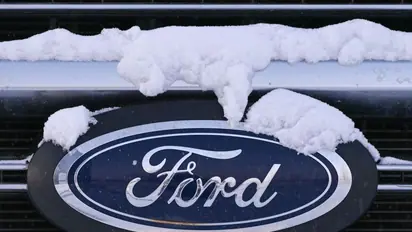Ford, GM, Stellantis Reportedly Lobby For Tariff Relief On Key Car Parts As Retail Traders Weigh Impact

Synopsis
Detroit’s ‘Big Three’ are pushing for exemptions on low-cost and labor-intensive parts, such as electrical wiring harnesses, typically sourced from Mexico and other low-wage countries.
Shares of Ford Motor Co., General Motors, and Stellantis collectively saw heightened retail investor chatter on Monday after a report suggested the legacy automakers are seeking some relief from President Donald Trump's auto tariffs, which are expected to kick in later this week.
According to Bloomberg, executives from Detroit's 'Big Three' car companies met with the White House, the Commerce Department, and the U.S. Trade Representative about Trump's plan to levy tariffs on auto components, on top of the 25% levy on fully assembled vehicles made outside America.
The automakers are reportedly prepared to accept tariffs on finished vehicles and major components like engines and transmissions but are pushing for exemptions on low-cost and labor-intensive parts, such as electrical wiring harnesses, typically sourced from Mexico and other low-wage countries.
They have warned that levies on smaller parts could add billions in costs, triggering layoffs and profit warnings.
So far, Trump has not confirmed if he is considering such exemptions.
On Stocktwits, sentiment for the three auto stocks remained mixed, showing little change from the previous day.
Retail sentiment for Ford held at 'neutral' as the stock edged lower in after-hours trading Monday, with message volume spiking over 270%.
Sentiment for GM and Stellantis remained at similarly 'bullish' levels, accompanied by 'extremely high' message activity.
One bearish user speculated that a Ford Mustang would cost $67,000 because tariffs would be passed down to the consumer, making it unaffordable for most.
However, another user argued that a "spurt of sales activity" could follow as consumers rush to buy vehicles before tariffs take effect, adding that Ford's dividend yield still made it a good bet.
One watcher argued that Trump's current tariffs are "simply ASININE," adding that it would have been better to use a "stepped approach" for the companies to plan and adjust.
"Looking out several years, foreign car makers that would likely build more plants in the USA with non-union workers is not a positive for the Big Three," the post read.
On Friday, research firm Wedbush said Trump's tariffs would "send the auto industry into pure chaos" and raise the average price of cars by as much as $15,000.
A U.S. car with all parts made in the U.S. "is a fictional tale not even possible today," Wedbush wrote in a note to clients, adding that it would take three years to move 10% of the auto supply chain to the country and cost hundreds of billions "with much complexity and disruption."
Ford shares are up 1.2% year-to-date, while GM has lost more than 11% and Stellantis has shed more than 13%.
For updates and corrections, email newsroom[at]stocktwits[dot]com.<
Stay updated with all the latest Business News, including market trends, Share Market News, stock updates, taxation, IPOs, banking, finance, real estate, savings, and investments. Track daily Gold Price changes, updates on DA Hike, and the latest developments on the 8th Pay Commission. Get in-depth analysis, expert opinions, and real-time updates to make informed financial decisions. Download the Asianet News Official App from the Android Play Store and iPhone App Store to stay ahead in business.